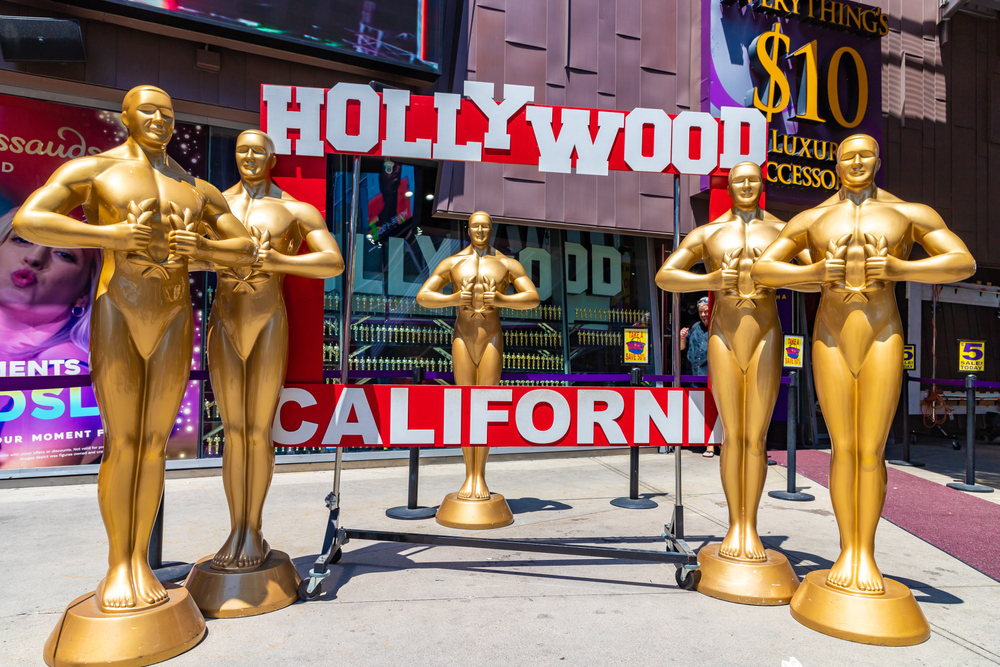Who’s in charge in Hollywood? Surely studio bosses, well-compensated executives, A-list actors, and celebrated writers and directors set the agenda in the American entertainment industry, don’t they?
Not so fast, says Wall Street Journal reporter Erich Schwartzel in a rigorously researched, admirably hard-hitting new book that looks at the pernicious influence of China on Hollywood. To be sure, China does not literally control, to adopt an appropriately Marxist term, “the means of production,” although the Chinese company Wanda Group was the improbable owner of the AMC Theatres chain for about a decade. Yet it’s undeniable that the powers that be in Hollywood appear perfectly happy to let the Chinese government set the terms of the American film industry’s presence in the Communist nation of 1.4 billion people. Why?
In Red Carpet: Hollywood, China, and the Global Battle for Cultural Supremacy, Schwartzel unpacks the political, economic, and strategic reasons behind Hollywood’s weak-willed assent to China’s power grab. As with so many things in show business, it’s just a matter of dollars and cents: In 1950, Mao Zedong instituted a ban on American films in China, but after decades of irrelevance on the international film scene, officials reversed course and, in the 1990s, consented to the importation of a limited number of U.S. releases. Thus a sleeping giant was roused at the box office. Today, according to Schwartzel, the country produces annual box-office grosses in the neighborhood of $1 billion—“a market,” he adds, “that became too big to ignore and too lucrative to anger.”
In one example after another, Schwartzel illustrates how Hollywood’s pursuit of revenue in China has led it to cede power to Communist officials, who dictate which American movies can be imported to their country, in what form they will be shown, and even which Hollywood stars can be rendered unemployable for statements that run contrary to the party line. Consider Richard Gere, who landed on what Schwartzel characterizes as a blacklist for his outspoken support of the Dalai Lama, not to mention his starring role in Red Corner, a thriller critical of China. “If you could have somebody else, then get somebody else,” an unnamed Warner Bros. casting executive tells the author about Gere.
In the process, the American film industry has not merely further empowered a corrupt regime but also shown there are few moral standards it won’t discard or artistic compromises it won’t make in the pursuit of higher grosses.
Of course, this is par for the course in the film business, which the late director Peter Bogdanovich once defined to me this way: “You see, it’s a monstrous business. It’s hell. It’s pretty much like any other kind of business. The merchandise happens to be humans as opposed to cars or cookies.” Yet even the most cynical observer is likely to be galled by Schwartzel’s exhaustive account of Hollywood yielding to the aesthetic diktats of a totalitarian state.
Betraying its noble heritage as an exporter of democratic values, Hollywood has permitted itself to become, as Schwartzel puts it, “a commercial arm for China’s new ambition.” The American film industry complies with the alteration of scripts and the removal of scenes from finished films—whatever Chinese authorities want. “Even more disturbing than the movies changing were the ones not getting made at all, for fear of angering Chinese officials,” he writes. In Schwartzel’s telling, this dance between Hollywood and China has “braided a censorious agenda into moviemaking, corrupting America’s most effective tool for selling democracy and free expression to the world.”
Among the many instances of “anticipatory censorship” that industry leaders have engaged in, the sorry episode of MGM’s 2012 remake of Red Dawn stands out. In the late ’00s, the studio reached into its library of titles for remake consideration and came up with 1984’s Red Dawn, John Milius’ bracing anti-Communist adventure depicting Soviet forces invading and subduing the American heartland. For the updated version, China, not the Soviet Union, was to serve as the evil empire—that is, until MGM got wind of Chinese backlash and potential distributors balked.
“For the producers of Red Dawn, that meant the only solution was a drastic one: changing the enemy of the completed film,” writes Schwartzel, who details a chain of events so cynical they would not be out of place in the most trenchant satires of Hollywood, such as Blake Edwards’s S.O.B. or Robert Altman’s The Player. Faced with an unreleasable film, MGM swapped China for North Korea. Digital-effects teams got to work to effectuate the change without shooting new scenes, including changing the “enemy” flags. “This would not be a copy-paste operation of swapping in one nation’s flag for another,” Schwartzel writes. “It would require erasing the Chinese flag and painting the North Korean one in its place, changing it frame by frame so its movements registered as realistic.”
Yet, preposterous though it is, the Red Dawn incident is not an anomaly but instead the logical culmination of a chain of capitulations that stretch back decades.
Schwartzel recounts Hollywood’s cowardice in failing to support Martin Scorsese’s masterly portrait of the young Dalai Lama, Kundun, which Universal Studios passed on for fear of repercussions from China that would impact then-owner Edgar Bronfman Jr.’s beverage business, Seagram. Kundun was ultimately produced by Disney and released with minimal ballyhoo. After the film had come and gone, Disney’s then-CEO Michael Eisner made a humiliating trek to China to apologize for the film’s existence. (“The bad news is that the film was made; the good news is that nobody watched it,” Eisner said.) Shanghai Disneyland opened in 2016.
Such is the means by which Hollywood loses its last smidgen of integrity. Schwartzel itemizes a series of surrenders to Chinese censors, from the excision of shots showing Tom Cruise running past clotheslines draped with drying underwear in Mission: Impossible III(“The censors made sure no one could see China’s dirty laundry”) to the deletion of the words wizard and sorcerer from Harry Potter and the Sorcerer’s Stone (since both terms were uncomfortably close to the “supernatural elements” Chinese officials frown upon). Also discussed at length are a rather pitiful lot of former Hollywood filmmakers, who, having outlived their usefulness to the major studios, opportunistically picked up stakes for China, where they now serve as “one-man instruction manuals” for the burgeoning Chinese film industry. These include Finnish auteur Renny Harlin, whose Hollywood credits include such non-masterpieces as Die Hard 2 and Cutthroat Island but who is described by Wanda Group producer Peggy Pu as having “prestigious credits. That’s why we chose him.” No matter that Harlin has a scant understanding of Chinese. “I am just judging their performances on the universal scale of emotions,” he says lamely.
That an undistinguished hack like Harlin lets us down is perhaps unsurprising, but what about Steven Spielberg? At a time when China’s complicity in the genocide in Sudan was generating considerable media attention, the director of Jaws and Schindler’s List relinquished his planned role as artistic adviser for the 2008 Beijing Olympics’ opening ceremony, but not even a decade later Spielberg’s Amblin Partners entered into a deal with the Chinese e-commerce company the Alibaba Group.
Schwartzel writes with an invigorating sense of indignation, though his book is never preachy and contains numerous fascinating sociological details. He notes that one of Amblin’s projects, A Dog’s Purpose, did so-so business at the U.S. box office but took off like a rocket in China strictly due to lifestyle changes among moviegoers there: “Pet ownership across the country was rising, and Alibaba knew this better than anyone. They knew who bought dog bowls and the homes where they used them, thanks to their e-commerce platform.” The author also sees some signs of hope in Netflix’s almost unprecedented (in today’s environment) willingness to get behind projects critical of China, including Steven Soderbergh’s The Laundromat, though the studio’s reasons are far from noble: China is simply among the countries in which Netflix has been unable to get a foothold.
How long will Netflix’s independence last? No one can say, but Schwartzel seems to doubt that anything can stop China’s ascendency in motion pictures. “China started this century as the savvy ingénue, eager to learn,” he writes. “Countless Hollywood movies have taught us what happens next. The ingénue grasps for the leading role.”

